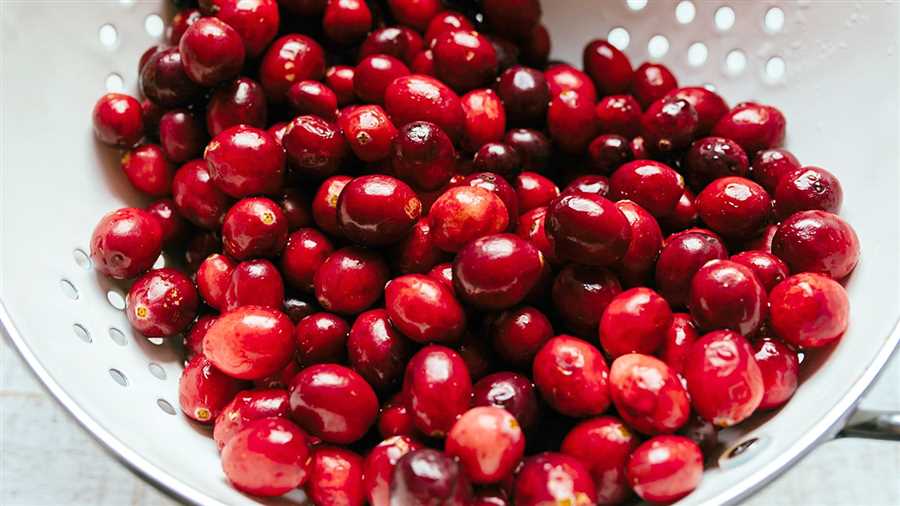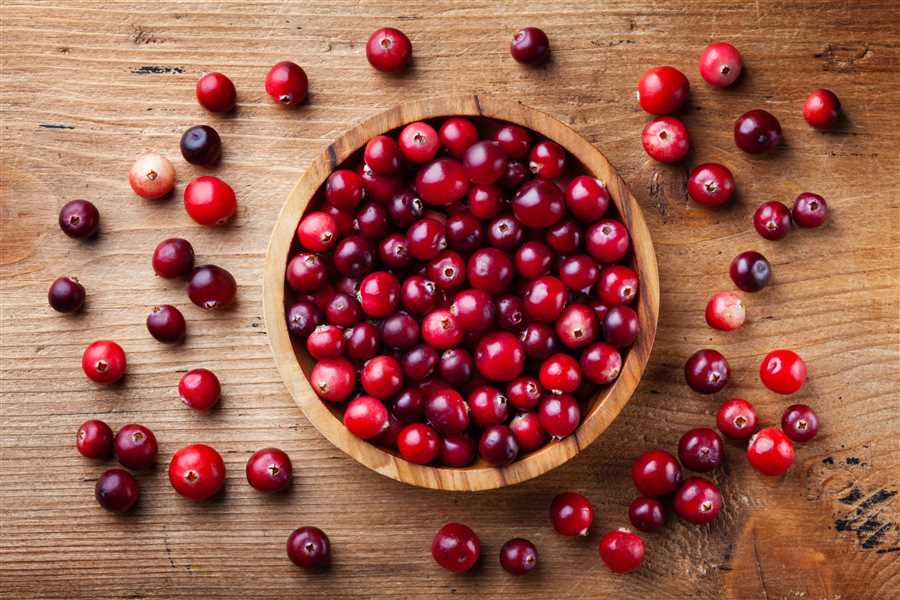Cranberries are a popular fruit often associated with the holiday season. These small, tart berries are packed with nutrients and are known for their unique taste. But can you eat fresh cranberries without cooking them? The answer is yes.
Fresh cranberries can be enjoyed raw, just like any other fruit. However, due to their tart and tangy flavor, they are often combined with other ingredients to balance the taste. Many people choose to sweeten fresh cranberries with sugar or honey to make them more palatable.
In addition to being consumed raw, fresh cranberries can also be used in a variety of dishes. They can be added to salads, smoothies, and sauces. They can also be baked into pies, cakes, and breads. The possibilities are endless when it comes to incorporating fresh cranberries into your culinary creations.
It’s important to note that while fresh cranberries can be eaten without cooking them, some people prefer to cook them to mellow out their tartness. Cooking fresh cranberries can also enhance their flavor and texture, making them softer and easier to eat. So whether you choose to eat them raw or cooked, fresh cranberries are a delicious and nutritious addition to your diet.
The Benefits of Eating Fresh Cranberries
1. Nutritional Value: Fresh cranberries are a rich source of essential nutrients. They are low in calories and packed with vitamins, minerals, and antioxidants. These include vitamin C, vitamin E, vitamin K, manganese, and fiber, which are all important for maintaining good health.
2. High in Antioxidants: Fresh cranberries are known for their high antioxidant content. Antioxidants help protect the body against free radicals, which are harmful molecules that can damage cells and contribute to various diseases. Consuming fresh cranberries regularly can help boost your immune system and overall well-being.
3. Supports Heart Health: Research suggests that eating fresh cranberries may have a positive impact on heart health. Cranberries contain phytonutrients called flavonoids, which have been shown to help reduce the risk of heart disease. They may also help lower blood pressure and improve overall cardiovascular health.
4. Supports Digestive Health: Fresh cranberries are a great source of dietary fiber, which is essential for a healthy digestive system. Fiber helps promote regular bowel movements, prevent constipation, and maintain a healthy gut. Adding fresh cranberries to your diet can help support digestive health and prevent digestive disorders.
5. Promotes Urinary Tract Health: Consuming fresh cranberries has been associated with a reduced risk of urinary tract infections (UTIs). The natural compounds found in cranberries prevent bacteria from adhering to the urinary tract, reducing the risk of infection. Regular consumption of fresh cranberries can help promote a healthy urinary tract.
6. May Aid in Weight Loss: Fresh cranberries are a low-calorie food that can be a valuable addition to a weight loss diet. They are high in fiber, which helps keep you feeling full and satisfied for longer. This can help reduce overeating and promote weight loss.
Conclusion: Fresh cranberries are not only delicious but also offer numerous health benefits. They are a nutrient-dense food that can support your overall well-being. Whether eaten raw or cooked, incorporating fresh cranberries into your diet can be a great way to boost your health.
Cranberries: A Nutritional Powerhouse
Cranberries are small, tart berries that are native to North America. They are packed with nutrients and provide many health benefits. Whether eaten fresh or cooked, cranberries offer a plethora of nutritional advantages.
1. High in Vitamins and Minerals
Cranberries are a rich source of vitamins and minerals. They are particularly high in vitamin C, which is essential for maintaining a healthy immune system and promoting collagen production. They also contain vitamins E and K, along with minerals such as manganese and copper, which are important for various bodily functions.
2. Antioxidant-Rich
Cranberries are known for their high antioxidant content. Antioxidants help protect the body against free radicals, which can damage cells and contribute to chronic diseases. Consuming cranberries regularly may reduce the risk of inflammation and certain types of cancer.
3. Promote Heart Health

Regularly consuming cranberries may help improve heart health. Cranberries contain flavonoids, which have been shown to reduce the risk of heart disease by improving blood vessel function and preventing the buildup of plaque. They also contain compounds that help lower cholesterol levels.
4. Urinary Tract Health
Cranberries are well-known for their ability to promote urinary tract health. They contain compounds called proanthocyanidins, which can help prevent bacteria from sticking to the urinary tract walls, reducing the risk of urinary tract infections.
5. Low in Calories and High in Fiber
If you’re watching your calorie intake, cranberries are an excellent choice. They are low in calories and high in fiber, which can help promote feelings of fullness and aid in weight management. The fiber content also helps support digestive health.
In conclusion, cranberries are a nutritional powerhouse that offer numerous health benefits. Whether consumed fresh or cooked, they can provide a valuable addition to a balanced diet. So go ahead and enjoy the tangy flavor and the wide array of nutrients that cranberries have to offer!
Health Benefits of Fresh Cranberries
Fresh cranberries are a low-calorie, nutrient-dense fruit that provide a wide range of health benefits. They contain high levels of antioxidants, vitamins, and minerals, making them a great addition to a healthy diet. Here are some of the key health benefits of consuming fresh cranberries:
1. Boosts Immunity
Fresh cranberries are rich in vitamin C, which is known to strengthen the immune system. Regular consumption of cranberries can help prevent common illnesses like colds and flu.
2. Supports Heart Health
Cranberries are high in flavonoids and antioxidants that can help reduce the risk of heart disease. Studies have shown that the phytonutrients in cranberries can help lower blood pressure and improve overall heart health.
3. Promotes Digestive Health
The high fiber content in fresh cranberries promotes healthy digestion and can help prevent constipation. They also contain compounds that have been shown to inhibit the growth of harmful bacteria in the digestive tract.
Remember: While fresh cranberries can be eaten without cooking, some people may find their tart taste too intense. If this is the case, you can try consuming them in the form of juice or adding them to salads, smoothies, or sauces.
In conclusion, fresh cranberries offer numerous health benefits due to their high nutritional content. Incorporating them into your diet can help boost your immune system, support heart health, and promote a healthy digestion. So go ahead and enjoy these vibrant red berries to enhance your overall well-being!
The Antioxidant Properties of Cranberries

Cranberries are highly regarded for their antioxidant properties. Antioxidants are compounds that help protect the body against free radicals, which are unstable molecules that can cause damage to cells and contribute to the development of various diseases, including heart disease and cancer.
One of the key antioxidants present in cranberries is vitamin C. Vitamin C is known for its ability to boost the immune system and help in the production of collagen, a protein that supports healthy skin, bones, and blood vessels.
In addition to vitamin C, cranberries also contain other important antioxidants, such as flavonoids and polyphenols. These compounds have been found to have anti-inflammatory and anti-cancer properties.
Research has shown that consuming cranberries or cranberry products may help reduce the risk of certain diseases, including urinary tract infections, stomach ulcers, and certain types of cancer. The antioxidants in cranberries may also help lower blood pressure and improve cardiovascular health.
To reap the full benefits of the antioxidants in cranberries, it is best to consume them in their natural form, either fresh or frozen. Cooking cranberries may decrease their antioxidant content. However, it is important to note that the overall nutritional value of cranberries remains high, even after cooking or processing.
In conclusion, cranberries are a powerhouse of antioxidants, including vitamin C, flavonoids, and polyphenols. Consuming fresh or frozen cranberries can help protect the body against free radicals and reduce the risk of various diseases. So go ahead and enjoy this delicious and nutritious fruit!
Incorporating Fresh Cranberries into Your Diet
Fresh cranberries are a versatile and nutritious fruit that can be incorporated into your diet in various ways. While many people prefer to cook cranberries before consuming them, they can also be enjoyed raw.
Here are some ideas for incorporating fresh cranberries into your diet:
- Snack on fresh cranberries: Wash them thoroughly and enjoy them as a healthy snack. Their tart and slightly bitter taste can be balanced out with a sweetener if desired.
- Add them to salads: Toss a handful of fresh cranberries into your favorite salad for an added burst of flavor and texture. They work well with both green salads and grain-based salads.
- Blend them into smoothies: Cranberries can be a great addition to smoothies, adding a tangy and refreshing flavor. Pair them with other fruits like oranges, apples, or pineapple for a delicious and nutritious drink.
- Make cranberry sauce: If you enjoy the tartness of cranberries, try making your own cranberry sauce. Simply blend fresh cranberries with sweeteners like honey or maple syrup, and cook them until they burst and thicken.
- Bake them into desserts: Fresh cranberries can be used in various baked goods, including muffins, cakes, and bread. Their vibrant color and tangy taste can add a unique twist to your favorite recipes.
- Freeze them for later use: If you have a surplus of fresh cranberries, consider freezing them for later use. Frozen cranberries can be added directly to smoothies or used in cooked dishes.
Remember to consume cranberries in moderation as part of a balanced diet. They are a rich source of antioxidants and vitamins, but their tartness may not appeal to everyone’s taste buds. Experiment with different recipes and enjoy the unique flavors that fresh cranberries can bring to your meals.
Questions and answers
Can you eat fresh cranberries without cooking them?
Yes, you can eat fresh cranberries without cooking them. However, they have a very tart flavor and some people find them too sour to eat raw.
Are cranberries better for you when eaten raw?
Cranberries are packed with nutrients and antioxidants, so they are beneficial for your health whether eaten raw or cooked. However, cooking them may reduce some of their nutrient content.
Can you eat too many fresh cranberries?
While cranberries are generally safe to eat, consuming excessive amounts may lead to digestive issues such as an upset stomach or diarrhea. It’s best to consume them in moderation.
What are some ways to eat fresh cranberries?
There are many ways to enjoy fresh cranberries. You can eat them raw, add them to salads, blend them into smoothies, make cranberry sauce, or bake them into muffins or bread.
Do fresh cranberries have any health benefits?
Yes, fresh cranberries are highly nutritious and have several health benefits. They are rich in antioxidants, fiber, and vitamin C. They may help improve urinary tract health, reduce the risk of certain cancers, and promote heart health.






